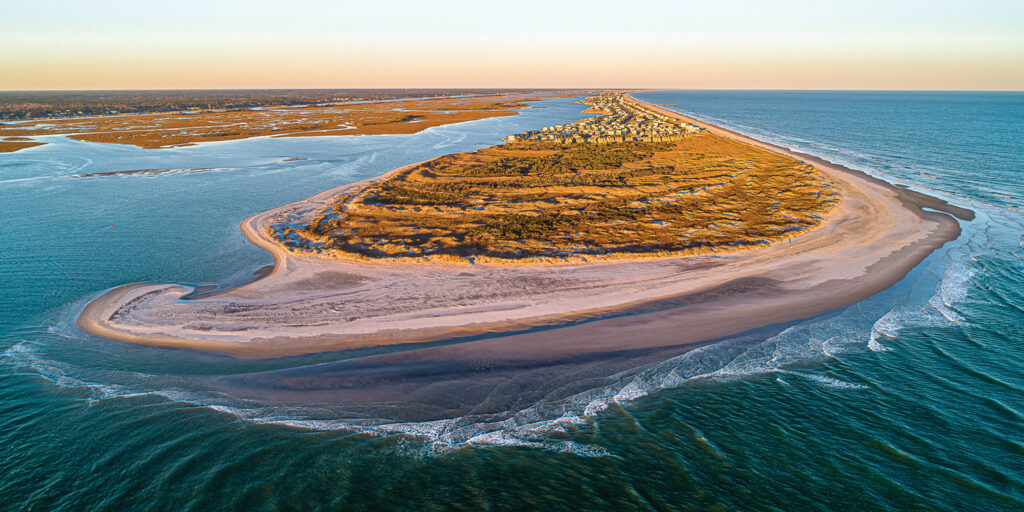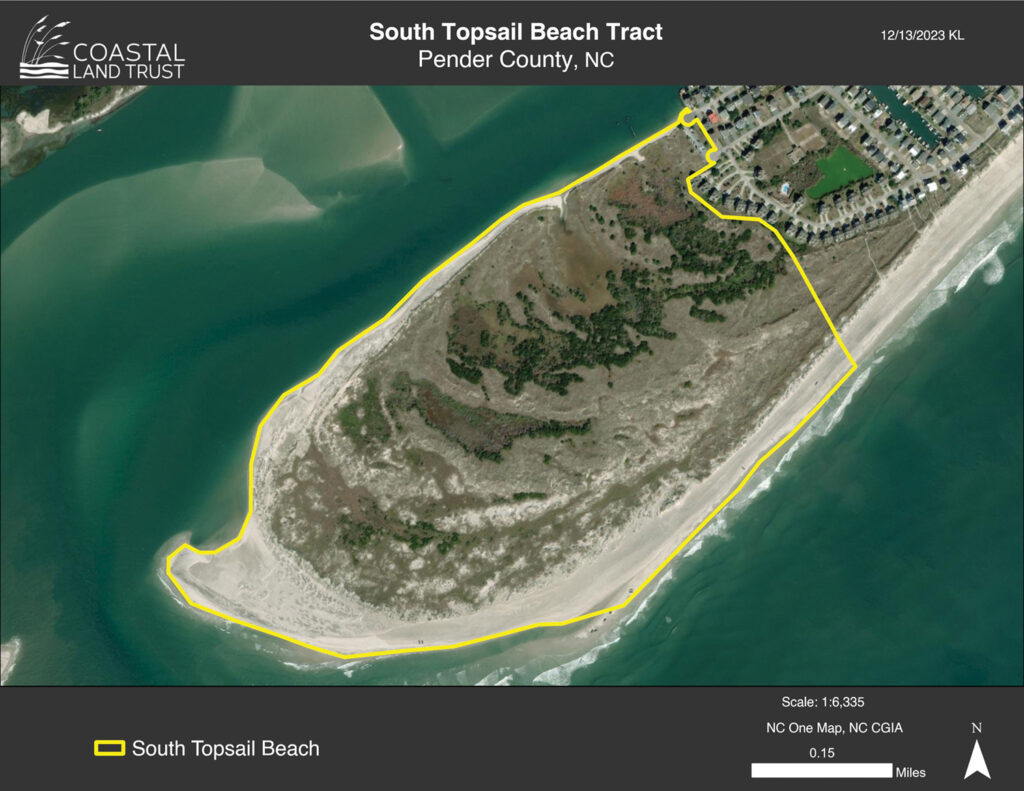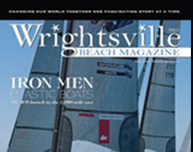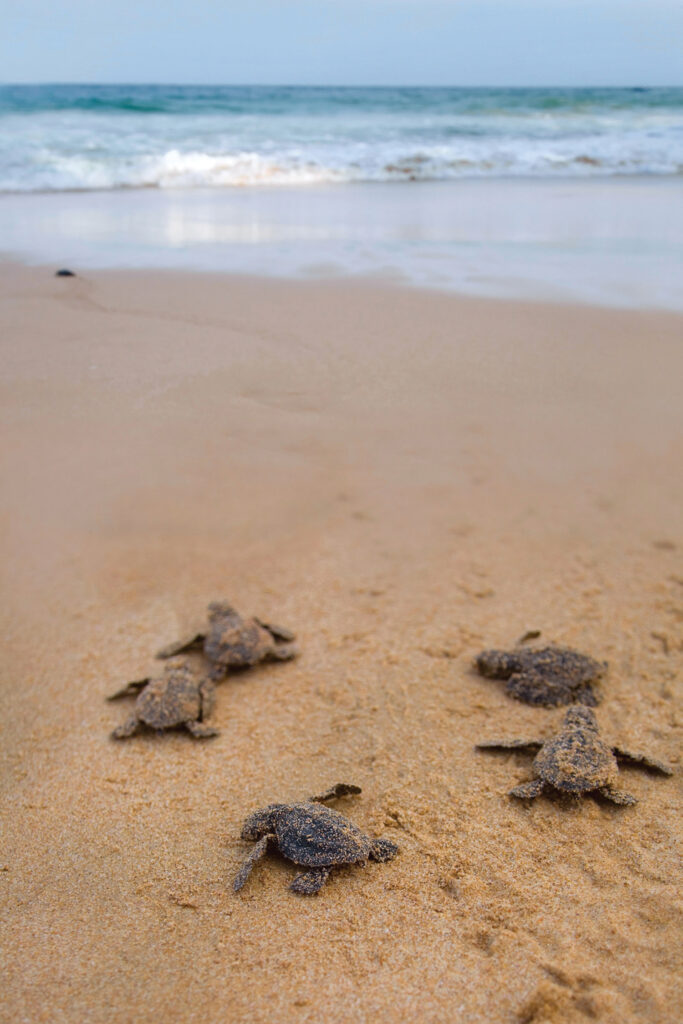Treasuring Natural Resources
$8 million sought to purchase The Point
BY WBM Staff

For almost two years, Topsail Island residents and visitors have advocated to keep the south end of Topsail Beach undeveloped. The land at the southern tip of the barrier island is privately owned.
Advocates for preservation united with Roy Costa, who formed a nonprofit, Conserve the Point, in June 2022 to stop development. A petition to protect The Point, as it is also known, garnered 3,500 signatures.
Their battle over The Point has been not only with the town but with prospective property purchaser Todd Olsen and his wife, Laura. At stake is the peninsula owned by three families encompassing more than 149 acres of maritime shrub forest and sand dunes, with wetlands and approximately 1.6 miles of shoreline along Banks Channel, New Topsail Inlet, and the Atlantic Ocean.
In 2023, Olsen, founder and CEO of Raleigh tech company Pendo, and his wife were poised to complete the purchase pending the town’s approval of their application to rezone 20 acres that they would develop into a family compound. They offered to preserve the remainder.
In 2022, the town had adopted a new conditional rezoning for proposed development projects. The modification to the town ordinance came at the request of Olsen, who did not disclose any intent to develop the point at that time. Olsen’s technology company opened in North Carolina in 2013, with additional locations now in New York City, San Francisco, the United Kingdom, Israel, Tokyo, and Australia.
The proposed development plans included seven single-family homes, with a maximum size of 4,000 square feet, a swimming pool with a pool house and cooking facilities, a beach walkway with a gazebo, a marina with six boat lifts, and a maintenance building and garage.
Public outcry against the rezoning request ended in November, when the Olsens withdrew the rezoning request and purchase offer.

Residents and those who use the south end for recreation want the point protected and kept pristine. Enter the North Carolina Coastal Land Trust in late March, with the announcement of a fundraising initiative to purchase and preserve The Point. The Coastal Land Trust is under contract with the McLeod, Oppegaard and McCullen families to purchase, with a deposit, the 149+ acres. The contract has a 2025 closing date.
The land trust estimates it will need to raise $8 million to complete the purchase. While they are seeking private donations, as much as $3 million to $5 million could be funded by grants from three nonprofits, including the North Carolina Land and Water Fund.
Founded in 1992 and headquartered in Wilmington, the North Carolina Coastal Land Trust conserves natural areas and working lands while promoting education and good land stewardship. The trust has protected more than 87,000 acres with scenic, recreational, historic, and/or ecological value. Wilmington’s Hal Kitchens is president of the board of directors.
The Coastal Land Trust plans to transfer the property to the State of North Carolina to be managed by the Department of Environmental Quality’s Division of Coastal Management. The goal is to permanently protect the land and manage it in a way that balances conservation and public access.
“We recognize the invaluable significance of conserving South Topsail Beach for its ecological importance and as a cherished community asset,” Tancred Miller, Division of Coastal Management director, said in a March press release. “We are committed to partnering with the Coastal Land Trust and other stakeholders to ensure the public benefits of preserving this pristine coastal gem.”
Hatchling to the Sea
Loggerhead hatchlings and juveniles spend the first 7 to 15 years of their lives in the open ocean.
Loggerhead sea turtle nesting season begins in May and runs through November along the North Carolina coast.
While there is no firm timetable, eggs will typically hatch anytime between 50 and 60 days after the nest is laid. Hatching typically occurs after 9 p.m. and before 5 a.m. The freshly hatched turtles frequently dig their way up and out of the nest in what is referred to as a boil. Sea turtle nests and hatchlings are protected by the Federal Endangered Species Act of 1973 as well as North Carolina Marine Mammal Protection Act of 1972. Report suspected nesting activities to the NOAA Fisheries Marine Wildlife hotline for the state of North Carolina (252) 241-7367.
Stay clear and out of sight of a turtle as she is laying eggs, otherwise you may scare her back to the sea without laying her eggs.
If you see a marked nest, do not approach it. Keep dogs on leash. Destroying a sea turtle nest or eggs is a third-degree felony punishable by up to a $5,000 fine and or five years in prison.


